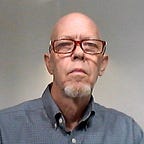Responding to Tiago Miranda’s Article About Wilderness
I think I’ve been to a place or two that were largely undisturbed by the human part of the ecosystem. But I see your point.
Well first, here’s the brilliant article I’m talking about: Wilderness’ Misconception
And for sure, it’s the indigenous people who educated me the most in my wanderings. I always knew that in California, where I did most of my wilderness exploring, that the natives had terraformed or at least changed the plant and animal ecosystems from fires they’d set and walked away from.
This is how all humans lived on Earth before it got overpopulated. It just didn’t matter in any important way back then, when at times the human global population was only a few million.
I guess in that way I haven’t lost my own definition of wilderness.
For me it’s the least-recently occupied tracts of land or water that were affected by human carelessness. They still exist in some areas, but they won’t be for long.
Some are surprisingly locked into blocked-off parts of cities. I call those wildernesses, because they have that feel.
But say, as the experts say, that 35,000 years ago there were 10 million humans on Earth. (I’m pretty sure it was more like 4 million when we almost went extinct.)
But compare the numbers:
10,000,000
7,900,000,000
Ten million then, 7.9 billion now, at a time the Earth can’t support them. You have to be a mathematician like me to see the absurdity.
I think that in the next several decades we’ll have plenty of wilderness again, and far fewer people. I won’t be here, but it feels good to know this.
One thing I learned from wildernesses, which I mostly explored alone, is that you can easily die in them. (Hence being connected to indigenous folk.) I think it was 3 or 4 times I laid down and let nature decide.
Thank you for reading, and take care.
~ Fred Ermlich
You can also share your love and concerns for this lovely planet. Just click the below image and be a writer for The Environment
